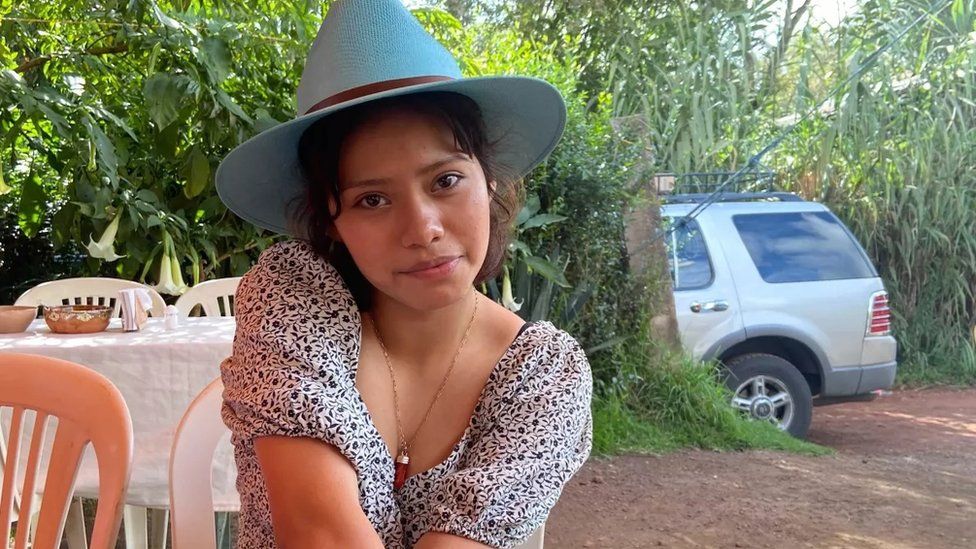ARTICLE AD BOX
 Image source, Ramos family
Image source, Ramos family
Melanie Ramos was 15 when she took a pill that killed her
By Regan Morris
BBC News, Los Angeles
Teen overdose deaths have never been higher in the US as young Americans are increasingly poisoned by the synthetic opiate fentanyl, even as fewer teens use drugs.
More than 100,000 Americans died of drug overdoses last year - the vast majority were adults - but the fastest growing group to die of overdoses were teenagers.
Melanie Ramos' family knows this all too well. The 15-year-old girl died inside her school's bathroom last month after taking a pill laced with fentanyl.
Melanie and her friend thought they were taking Percocet, a pain medication that is sometimes abused. But the counterfeit pills were laced with fentanyl and she was poisoned.
"She was a beautiful, sweet girl coming from hardworking parents," her uncle Oscar said at a candlelight vigil on the steps of Bernstein High School, where friends and family prayed in Spanish and placed flowers on a shrine to Melanie.
Fentanyl is typically smuggled into the United States by Mexican drug cartels. While it used to be laced into the hardest drugs like heroin, the cartels now mass-produce fentanyl pills in rainbow colours to mimic prescription pills and, some say, to target kids who are more willing to experiment with them.
In Los Angeles a spate of overdose deaths from pills has authorities worried, and on Wednesday, the state of California seized 52lb (24kg) of fentanyl powder - enough to make a quarter million pills - as part of a state-wide operation led by the Justice department.
But the problem extends across the US. In New York last week, authorities seized 15,000 rainbow coloured pills hidden in a Lego toy box.
The US is an outlier when it comes to overdoses, with a death rate 20 times the global average - although Scotland is not far behind.
"We are far and away the world leader in overdose death unfortunately," said Joseph Friedman, a substance use researcher at the University of California Los Angeles.
The overdose rate among school-aged children in the US doubled between 2019 and 2020 and then rose a further 20% last year, he said.
"Teen drug use is becoming more dangerous but not more common," Mr Friedman said, adding that fentanyl, not the stress of the pandemic was to blame: Teen drug use actually dropped sharply during the pandemic because it is usually a social activity.
Melanie's high school, like other LA schools, will now stock Narcan, an overdose reversal medication
At a contentious meeting at Bernstein High School, where Melanie died, officials and police warned upset families and children that "one pill can kill".
Her death has prompted LA officials to stock the overdose reversal medication, Narcan, in every school.
The medication, which commonly comes in the form of a nasal spray, can be used by anyone to reverse the effects of an overdose.
Increasing access to Narcan is also part of a federal response to the opioid crisis announced this month by the Biden administration, which said it would inject $1.5bn (£1.3bn) to fund programmes and support law enforcement to go after drug traffickers.
Experts say teens will experiment with drugs no matter what they are told or taught in schools, so overdose prevention is the only way to slow the growth in overdose deaths.
Community Health Project Los Angeles workers provide free Narcan and fentanyl testing strips - so people can test drugs before getting high. They are glad schools will now keep Narcan on hand, and have urged parents and kids to carry it in their backpacks.
Image source, Getty Images
Image caption,Schools will have the nasal spray version of Narcan
At a recent training, drug and alcohol counsellor Sandra Mims demonstrated how to use the spray - one spritz up the nose, followed by a rub on the sternum. Then another spray 2-3 minutes later if the person overdosing did not respond.
"Children start as young as 12," Ms Mims said. "It's so much more deadly now with fentanyl and the synthetic pills."
Nick Angelo, who has used opiates in the past but now works for the non-profit, saved three people with Narcan in a single week. But he sounded weary rather than heroic when talking about it.
"When me and my friends were using opiates we didn't have to worry that every single hit we took could be our last," he said.

 2 years ago
20
2 years ago
20








 English (US)
English (US)